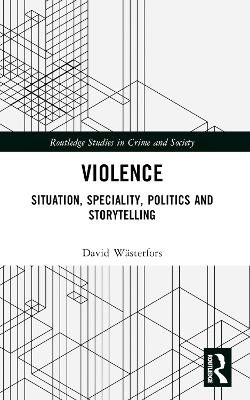
Violence
Situation, Speciality, Politics, and Storytelling
Seiten
2024
Routledge (Verlag)
978-1-032-20448-2 (ISBN)
Routledge (Verlag)
978-1-032-20448-2 (ISBN)
This book examines how the concept of violence has been interpreted, used, defined and explored by social researchers and thinkers.
This book considers how the concept of violence has been interpreted, used, defined, and explored by social researchers and thinkers. It does not provide a final answer to the question of what violence is or how it should be explained (or prevented), and instead offers a variety of useful ways of thinking about and theorising the phenomenon, mainly from a sociological standpoint.
It outlines four ways of understanding violence:
• Violence as situation: the tension that exists between category-driven and situational explanations.
• Violence as speciality: the study of particularly violent actors, and how they may be understood by reference to childhood histories, technologies, institutions, culture, class, and gender.
• Violence as politics: political violence and violent politics.
• Violence as storytelling: representations of violence from a narrative perspective.
Concluding with reflections on possible convergences between the four approaches and new directions for research, this book offers a unique and experimental approach to discussing and reconstructing the concept of violence. It is essential reading for criminologists, sociologists, and philosophers alike.
This book considers how the concept of violence has been interpreted, used, defined, and explored by social researchers and thinkers. It does not provide a final answer to the question of what violence is or how it should be explained (or prevented), and instead offers a variety of useful ways of thinking about and theorising the phenomenon, mainly from a sociological standpoint.
It outlines four ways of understanding violence:
• Violence as situation: the tension that exists between category-driven and situational explanations.
• Violence as speciality: the study of particularly violent actors, and how they may be understood by reference to childhood histories, technologies, institutions, culture, class, and gender.
• Violence as politics: political violence and violent politics.
• Violence as storytelling: representations of violence from a narrative perspective.
Concluding with reflections on possible convergences between the four approaches and new directions for research, this book offers a unique and experimental approach to discussing and reconstructing the concept of violence. It is essential reading for criminologists, sociologists, and philosophers alike.
David Wästerfors is Professor of Sociology at Lund University, Sweden.
Imagine… 1.Violence as situation 2.Violence as specialty 3.Violence as politics 4.Violence as storytelling 5.Scraps and side-tracks
| Erscheinungsdatum | 05.07.2022 |
|---|---|
| Reihe/Serie | Routledge Studies in Crime and Society |
| Zusatzinfo | 1 Halftones, color; 1 Illustrations, color |
| Verlagsort | London |
| Sprache | englisch |
| Maße | 138 x 216 mm |
| Gewicht | 249 g |
| Themenwelt | Recht / Steuern ► Strafrecht ► Kriminologie |
| Sozialwissenschaften ► Soziologie ► Allgemeines / Lexika | |
| ISBN-10 | 1-032-20448-6 / 1032204486 |
| ISBN-13 | 978-1-032-20448-2 / 9781032204482 |
| Zustand | Neuware |
| Haben Sie eine Frage zum Produkt? |
Mehr entdecken
aus dem Bereich
aus dem Bereich
wie wir unsere Mimik und verborgene Körpersignale entschlüsseln
Buch | Hardcover (2022)
Droemer (Verlag)
CHF 27,95


